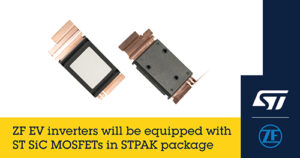ZF Technology Group will, starting in 2025, acquire silicon carbide devices from STMicroelectronics, a global semiconductor supplier serving customers across the entire spectrum of electronics applications.
 Under the terms of the multi-year contract, ST will supply a volume of millions of double-digit silicon carbide devices to be integrated into ZF's new modular inverter architecture, which will enter series production in 2025.
Under the terms of the multi-year contract, ST will supply a volume of millions of double-digit silicon carbide devices to be integrated into ZF's new modular inverter architecture, which will enter series production in 2025.
ZF will leverage ST's vertically integrated silicon carbide manufacturing in Europe and Asia to secure customer orders in electromobility.
“With this strategically important step, we are strengthening our supply chain so we can safely supply our customers. Our electromobility order book until 2030 now amounts to more than thirty billion euros. For this volume, we need several reliable suppliers for silicon carbide devices,” says Stephan von Schuckmann, member of the ZF Board of Management responsible for electromobility and materials management.
ST will manufacture the silicon carbide chips at its factories in Italy and Singapore, with packaging of the chips in STPAK, an advanced package developed by ST, and testing at its back-end facilities in Morocco and China.
“As a vertically integrated company, we are investing heavily to expand capacity and develop our silicon carbide supply chain to support our global and European customers in the automotive and industrial sectors as they pursue electrification and decarbonization goals.” , says Marco Monti, President Automotive and Discreet Group of STMicroelectronics. “The key to success in electric vehicle technology is greater scalability and modularity with greater efficiency, peak power and affordability.”
Connecting devices together
ST will supply ZF from 2025 with a volume of double-digit millions of third-generation silicon carbide MOSFET devices. ZF can connect a variable number of these devices to meet customers' performance requirements without changing the drive design. Among others, ZF will use the technology in inverters for vehicles from a European manufacturer whose production is scheduled to start in 2025.
The inverter is the brain of electrical transmissions. It manages the flow of energy from the battery to the electric motor and vice versa. Inverters have become more efficient and complex with each stage of development. The combination of inverter design and semiconductors such as silicon carbide is the key to improving electric vehicle performance.
Silicon carbide devices significantly reduce energy losses in electric car inverters, as well as in wind turbines and photovoltaic inverters. Devices made with silicon carbide have decisive advantages over conventional silicon-based products, such as greater efficiency, power density and reliability.
At the same time, they allow for smaller, more economical system designs. Simply put, an electric vehicle charges faster, goes further and has more space when equipped with silicon carbide-based semiconductors.

